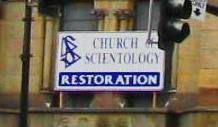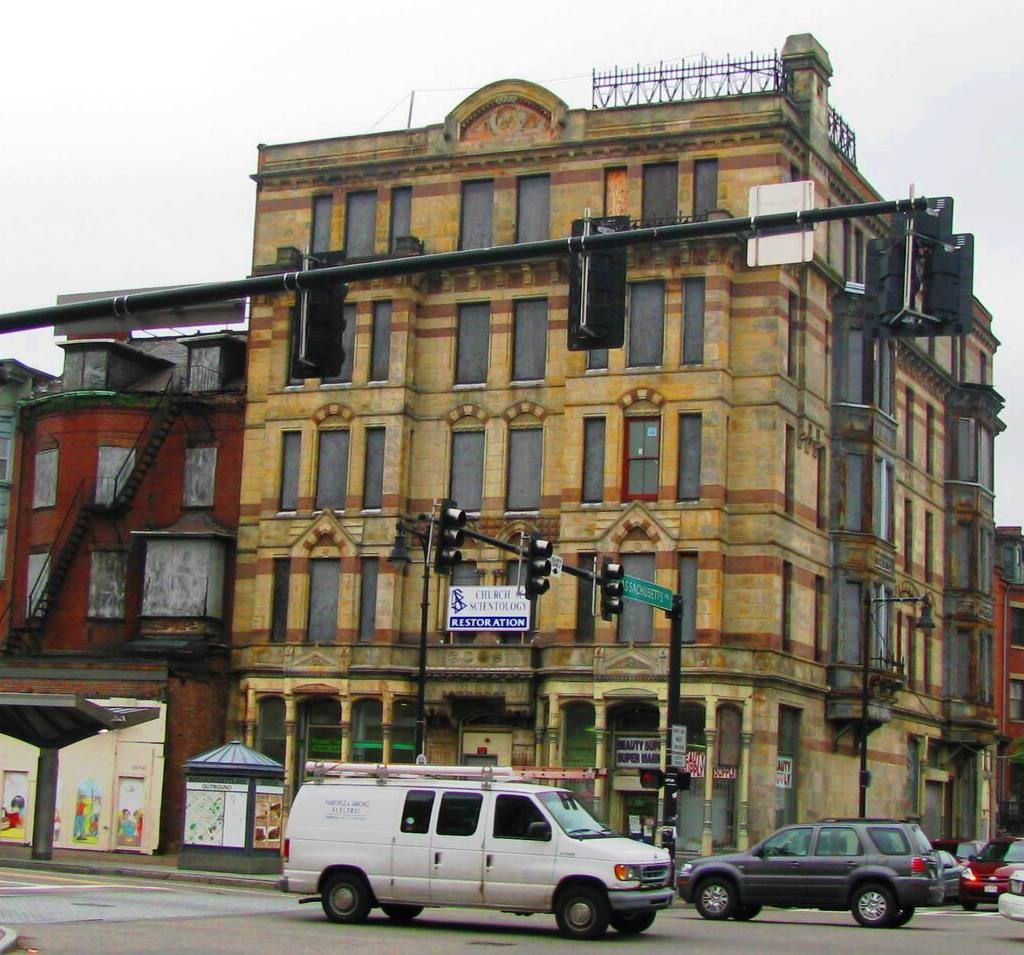City Officials, Residents Set To Battle Scientology Plan
By Thomas Grillo
Reporter
B&T staff photo by Thomas Grillo
The former Alexandra Hotel in Boston has been sold to the Church of
Scientology for $4.5 million. Neighbors prefer retail on the first floor that would
serve the area while the church wants a bookstore featuring Scientology
materials.
The Church of Scientology?s newest convert will be a former grande dame of Boston?s Washington Street.
Plans are under way for the church to restore the dilapidated Hotel Alexandra to its original luster. But city officials and residents of the South End and Lower Roxbury neighborhoods are preparing to battle the church over the first-floor uses of the 5-story landmark.
After more than a decade of promises by its owner to rehabilitate the building, Peter Bakis has sold the landmark at Washington Street and Massachusetts Avenue to the controversial church, best known for celebrity members such as actor Tom Cruise, for $4.5 million. The attorney representing the Church of Scientology said the church plans to renovate the building and convert the first-floor space to a Scientology bookstore and a caf?.
While the sale has brought relief to the neighborhood that the eyesore will finally be reborn, residents prefer ground-floor uses that will attract a broader crowd. ?The neighborhood has its share of problems with crime, homelessness, blight and boarded-up buildings, so many of us would like to see retail that brings people to the neighborhood,? said Christos Hamawi of the Worcester Square Area Neighborhood Association. ?A restaurant would work well or a small supermarket would be perfect. There?s potential to create jobs and provide retail that would be heavily used.?
Hamawi insisted that the neighborhood does not object to the church and he would make the same request of any new owner. ?It doesn?t matter what the organization is,? he said. ?This historic building is such a pivotal part of the neighborhood and what happens here can spur development all the way to Dudley Square. If not done right, it?s an opportunity lost.?
Randi Lathrop, the Boston Redevelopment Authority?s (BRA) director of community planning, agreed. She has talked to the church?s attorney and encouraged him to consider uses that would be more compatible with the area.
Former Boston City Councilor Michael J. McCormack, the lawyer for the Church of Scientology in Boston, confirmed that the church?s vision for the former hotel is to create a first level for visitors to browse Scientology books while having a cup of coffee in the caf?.
?The church has done more than 200 renovations of elegant buildings that have fallen into disrepair all over the world and they create a very welcoming place,? he said. ?They want you to come in, browse, and if you like what you see, ask questions; if not, you leave.?
Asked whether the church would meet the neighborhood?s and the city?s request for non-church-related retail, McCormack said it was too early to say.
?There have to be trade-offs,? he said. ?We are taking a building that was falling apart and will make it beautiful by activating the cityscape. To the extent that we can accommodate the neighborhood and the city, we will do it. But this is a church and not a commercial venture.?
Construction of the Hotel Alexandra in the mid-1870s was a speculative venture by Caleb Walworth and Emil Hammer, executives of the Walworth Manufacturing Co. in South Boston. The Alexandra was a residential hotel with commercial space at street level, a common building in the 19th century that provided wealthier urban dwellers with sprawling, well-appointed apartments in multi-unit buildings.
The building featured marble staircases, an elevator and metal-clad bay windows. The 2,000-square-foot apartments offered 12-foot ceilings, plaster crown moldings, steam heat, cast-iron columns and glass transoms for ventilation.
The Alexandra?s richly patterned sandstone facade provided a bold contrast to the brick row houses on Massachusetts Avenue. Its prominent corner location also created a gateway to Chester Square. The district retained its cachet as a fashionable residential neighborhood of single-family homes through the 1870s, at a time when much of the South End had converted into boardinghouses for immigrant and working families.
By the turn of the century, the fortunes of the Alexandra had changed. It too had become a boardinghouse, and construction of the Washington Street line of the Boston Elevated Railway in 1899 had obscured the building?s facade and turned the street into a noisy, less desirable place to live. The noise and intrusive design of the elevated streetcar brought a slow decline to the hotel and the neighborhood.
In January 2002, the BRA approved construction of 20 condominiums at the hotel. But Bakis showed no intention of moving forward with the project. As a result, Housing Court Judge Manuel Kyriakakis appointed a receiver to supervise the redevelopment. Since then, at least three offers were accepted, but none of the potential buyers could convince the owner to sign a purchase-and-sale agreement, a source close to the deals told Banker & Tradesman.
In 1993, a six-alarm fire of suspicious origin swept through the building. Later, a group of demonstrators occupied the upper floors in an effort to draw attention to the city?s homeless. They hung a banner from the top floor that said ?Housing Is a Human Right.?
Over the years, Bakis vowed to complete the renovation. But little was done to improve the building and promises to refurbish the Alexandra were broken, residents and officials said.
Since 2000, more than $650 million has been invested by public and private partnerships in the area. The Alexandra is one of the few blighted buildings on its block.
After years of stops and starts, at least one member of the Worcester Square Area Neighborhood Association is skeptical that the blighted building will be renovated. ?I don?t believe this will happen,? said Ray Lussier. ?We?ve been through this too many times and hopes have been raised and dashed too often for me to get excited about it. Perhaps the church has more credibility than previous buyers, but who knows??



